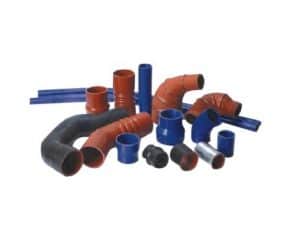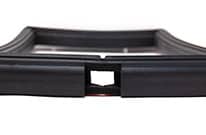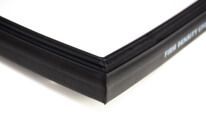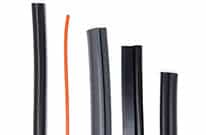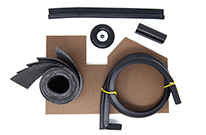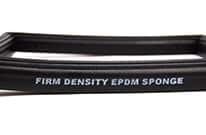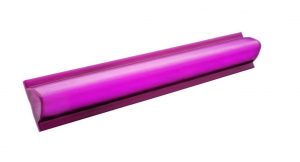 TPE profiles are replacing EPDM rubber in applications such as mobile equipment, food equipment, and infrastructure. Unlike EPDM, thermoplastic elastomers (TPE) are recyclable. That’s especially important in Europe, where manufacturers are moving away from petroleum-based materials.
TPE profiles are replacing EPDM rubber in applications such as mobile equipment, food equipment, and infrastructure. Unlike EPDM, thermoplastic elastomers (TPE) are recyclable. That’s especially important in Europe, where manufacturers are moving away from petroleum-based materials.
In North America and other parts of the world, the availability of TPEs in custom colors is driving demand. TPEs can cost more than EPDM profiles, but thermoplastic rubbers (TPRs) – as TPEs are sometimes called – offer important advantages for product designers and engineers. Are TPE profiles the right choice for your next project?
What are TPE Profiles?
TPE profiles are blends of plastic and rubber that have both thermoplastic and elastomeric properties.
- Thermoplastics are polymers that soften when heated, but then harden again when cooled.
- Elastomers are rubbery materials that stretch and compress under stress, but then return to their original shape when this stress is released.
By combining “the best of both worlds”, thermoplastic elastomers provide a unique blend of material properties. They are available as sponge profiles or solid profiles, come in D-shapes and other cross-sections, and are produced in single, double, and triple extrusions. With triple-extrusions, the third extrusion is typically for the skin on a sponge profile.
Types of TPE Profiles
Depending on the ingredients that are used, TPE profiles can meet application-specific requirements or comply with industry standards or certifications. With its network of trusted suppliers, Elasto Proxy can source these and other types of thermoplastic elastomers.
- Solid TPEs that are FDA and CE compliant
- Sponge TPEs that are CE compliant
- UL 94 and NF 92-507 compliant TPEs
- TPEs that resist aging, weathering, abrasion, and saltwater
- TPEs with a pending EN 45545 certification
Sizes, Tolerances, and MOQs
TPE profiles are available in a range of sizes and have significantly tighter tolerances (2x) than most extruders can achieve with EPDM or other rubber materials. Plus, the suppliers that Elasto Proxy works with offer TPE profiles in lower volumes for prototyping and production runs. In some cases, minimum order quantities (MOQs) as small as 25 m (80 to 85 feet) are available.
Standard and Custom Colors
TPE profiles come in just about any color you can imagine – including metallic and translucent colors. Standard colors include black, white, and light gray. Custom colors support distinctive designs, but profiles with multiple or different colors also offer advantages.
For example, a TPE profile with multiple colors can use one of the colors as a visual cue to show installers where to drill holes. To facilitate stocking and picking, buyers who need TPE extrusions in different sizes can order smaller profiles in one color and larger profiles in another color.
TPE Profiles That Light Up and Glow in the Dark
 TPE profiles can promote workplace safety, too. For example, some TPE extrusions glow in the dark with LED lighting, or shine under ultraviolet (UV) light. When used as safety bumpers, these photoluminescent and fluorescent materials alert personnel to potential dangers, especially under low-light conditions. In addition to minimizing the risk of injury, light-up TPE profiles can help to protect walls and equipment. Because thermoplastic elastomers are impact-resistant, they provide cushioning.
TPE profiles can promote workplace safety, too. For example, some TPE extrusions glow in the dark with LED lighting, or shine under ultraviolet (UV) light. When used as safety bumpers, these photoluminescent and fluorescent materials alert personnel to potential dangers, especially under low-light conditions. In addition to minimizing the risk of injury, light-up TPE profiles can help to protect walls and equipment. Because thermoplastic elastomers are impact-resistant, they provide cushioning.
Light-up TPE bumpers also support safety during equipment maintenance and the docking of boats. In the aerospace industry, TPE safety guards can be installed during aircraft maintenance. These bumpers protect personnel from sharp edges, but require removal when maintenance is complete. By shining a UV light on the work area, personnel can find any bumpers that remain. Light-up bumpers or dock fenders are also used at marinas to protect ships and built structures from collisions.
Custom-Fabricated TPE Profiles from Elasto Proxy
Elasto Proxy uses waterjet cutting to convert standard lengths of TPE extrusions, and various bonding or splicing techniques to join cut lengths. In addition to safety bumpers for mobile equipment, we supply TPE products for stainless steel and food equipment. Elasto Proxy can also source TPE membranes for building facades and windows. These extrusions are available with a maximum width of 400 mm and in a minimum production run of 100 meters.
To promote shorter lead times, Elasto Proxy can order TPE profiles from suppliers who maintain their own tools, have in-house tooling capabilities, and provide samples readily. Rush tools can be available in as little as 24 hours, and some of our partners keep tens of thousands of tools on hand. Available sizes range from a minimum thickness of 5 mm to an overall maximum of 150 mm x 600 mm.
For more information, contact Elasto Proxy.


